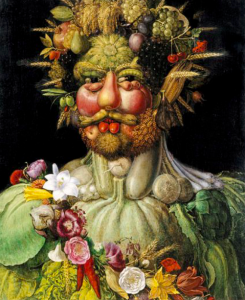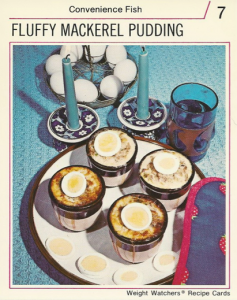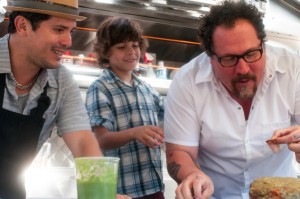Tag Archives: Food
Fluffy Mackerel Pudding
[A treat from the archives: this has been revised from an article originally published on Laura Grey’s Little Hopping Bird blog.]
In the 1970s, Weight Watchers and other companies created packs of recipe cards that they gave away with hideous giant plastic recipe boxes in order to try to hook gullible Americans (and perhaps Canadians, though I hope they had the good sense not to follow their U.S. cousins) into subscribing to a series of monthly recipe packs which arrived with billing statements and hefty postage fees. The special introductory offers provided a free recipe box and the first set of recipe cards in the hopes that the person ordering them (a.k.a. the sucker) would then get (and pay for) a new set of recipe cards every month. After a year or so, the sucker would have a whole collection of supposedly mouth-watering original recipes that would allow a hungry family to eat hearty, wholesome meals that would satisfy all their nutritional needs and cravings for just pennies a serving.
Once the vast majority of Americans realized they could get a free plastic recipe card box and 24 or so cards featuring scary color photographs of unappetizing food and then cancel their “memberships” in the recipe clubs, they were all stuck with giant awkwardly sized recipe boxes into which nobody could fit any of the recipes they might actually want to keep. I know this because I ordered my own giant plastic free recipe box when I was a child, and I kept it for years figuring I would someday figure out how to store actual recipes in it, to no avail.
A few years ago, I stumbled onto a brilliant website with fabulously unappetizing (and splendidly captioned) examples of Weight Watchers recipe cards from 1974. (The photos and captions are also available in book format as The Amazing Mackerel Pudding Plan: Classic Diet Recipe Cards from the 1970s by Wendy McClure.) Whenever I return to the site in hopes of lifting my spirits, I always start my pilgrimage to Tacky Town with my personal favorite recipe: “Fluffy Mackerel Pudding,” the highlight of the “Convenience Fish” section. The name speaks volumes.
Next, I make my way through the pack to revisit other mouth-watering delights such as “Hot Wrap Ups,” which include a hot lettuce, pickle, chive, caper and celery combo, as well as “Rosy Perfection Salad,” an exciting little number featuring shredded red cabbage in molded purple gelatin. Who could say no to a brandy snifter full of “Jellied Tomato Refresher,” or a man-pleasin’ pan full of “Mackerelly“?
The “Fish Tacos,” which are completely tortilla-free, look especially enticing with their shredded green cabbage, tomato chunks and some sort of chopped fish on a bed of . . . toast. And in the “Budget Best Bets” category, don’t forget “Frankfurter Spectacular,” a sexy little dish of hot dog halves wrapped around a pineapple core and garnished with carrot, potato and pineapple chunks. Between meals, why not fix yourself a plate of “Polynesian Snack,” featuring the excitement you can only find in a dish composed of canned bean sprouts, buttermilk, pimiento and fruit pieces. That’s snackin’ satisfaction!
For a peek at “Snappy Mackerel Casserole” or the famous tortilla-free “Marcy’s ‘Enchilada,'” you must check out the Candyboots Web site. The wicked captions on each card are the artificially colored maraschino cherry on the top of the whole delicious experience.
Want to make your very own dinner of fluffy mackerel pudding tonight? Here’s the recipe:
FLUFFY MACKEREL PUDDING
2 stalks celery
1 medium green pepper
8 ounces drained, canned mackerel, flaked
1 tablespoon dehydrated onion flakes
2 teaspoons prepared mustard
1 teaspoon salt
1/2 teaspoon cayenne pepper
1/8 teaspoon mace
Dash of ground cardamom
2 medium eggs, slightly beaten
2 medium eggs, hard-cooked, and sliced
Put celery and green pepper through a food grinder (or chop finely in blender). Combine with mackerel, onion flakes,mustard, salt, pepper, mace, and cardamom; mix well. Blend in raw eggs. Divide evenly into 4 (8 ounce) heatproof cups. Bake at 350°F (moderate oven) for 35 to 40 minutes. Garnish each with 1/2 sliced egg. Makes 4 luncheon servings.
For more off-putting recipe ideas from the 1970s, check out the Dinner is Served 1972 blog.
Chef: A Rare Treat from Jon Favreau
If you’re looking for a heartwarming, fresh and funny little film to give you a boost over the holidays, I highly recommend actor and director Jon Favreau’s delicious comedy Chef, which is now on DVD. This charming road picture features talented chef Carl Casper (Favreau), a man who has given up expressing his creativity in the kitchen in order to cook for an unimaginative restaurant owner (Dustin Hoffman) with diligence but without inspiration. After receiving a bad restaurant review, Carl vows to show what culinary magic he can work in order to salvage his reputation, but things don’t work out as planned. The fiasco forces Carl to start his life over, returning to his roots and focusing on creating simple but perfect food for the masses. This leads him to a closer, more reciprocal relationship with the young son he drifted away from when he let go of his passions and his greatest gifts.
The film has a leisurely pace and many thoroughly enjoyable scenes of preparing and devouring great meals. We go for a long, funny, often moving ride in an old food truck along with Carl, his son (played with great skill and warmth by young actor Emjay Anthony), and his loyal sous chef (played with gusto by John Leguizamo). Along the way we see the U.S. with new eyes and recognize that meals, like relationships, don’t have to be expensive and fancy to be exceptional and memorable.
The movie is essentially a love letter to food, family and friends, and Favreau, who is himself a skilled chef and gourmand, takes the time to show delicious-looking food prepared lovingly and authentically as part of the film’s exploration of preparing and sharing meals as a metaphor for sharing art, love and meaning. It’s well crafted, beautifully paced and so authentic in tone that each time I’ve seen it I’ve come away feeling like I just hung out with generous old friends who invited me to share something rare and meaningful with them.
Jon Favreau directed such crowd-pleasers as Elf and the first two Iron Man pictures, but he’s also a talented actor who got his first big break in Doug Liman’s very funny 1996 indie comedy Swingers. Favreau wrote the script for Chef in just two weeks and called in a few superstars (Robert Downey Jr. and Scarlett Johansson) to fill small roles, but the three key actors (Favreau, Anthony and Leguizamo) have such chemistry and take such genuine delight in each other that you hardly know or care about the big-ticket actors.
Often feel-good comedies have a manufactured, by-the-numbers feel to them. I don’t like being manipulated by a director who wants to spoon-feed me my emotions; I want a film to earn my respect and authentic responses. Chef made me feel as if I’d been drawn into something special and intimate. I hope you’ll find it as sweet and satisfying as I did.



